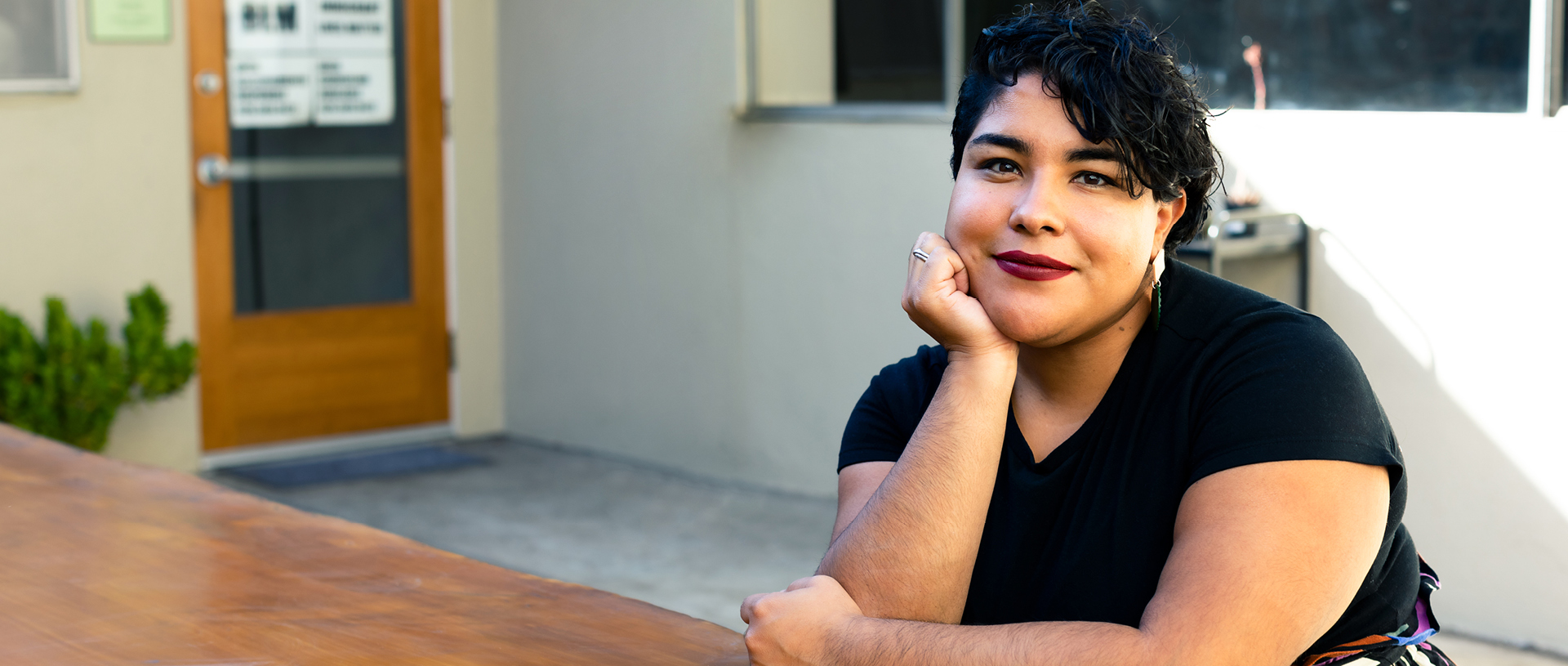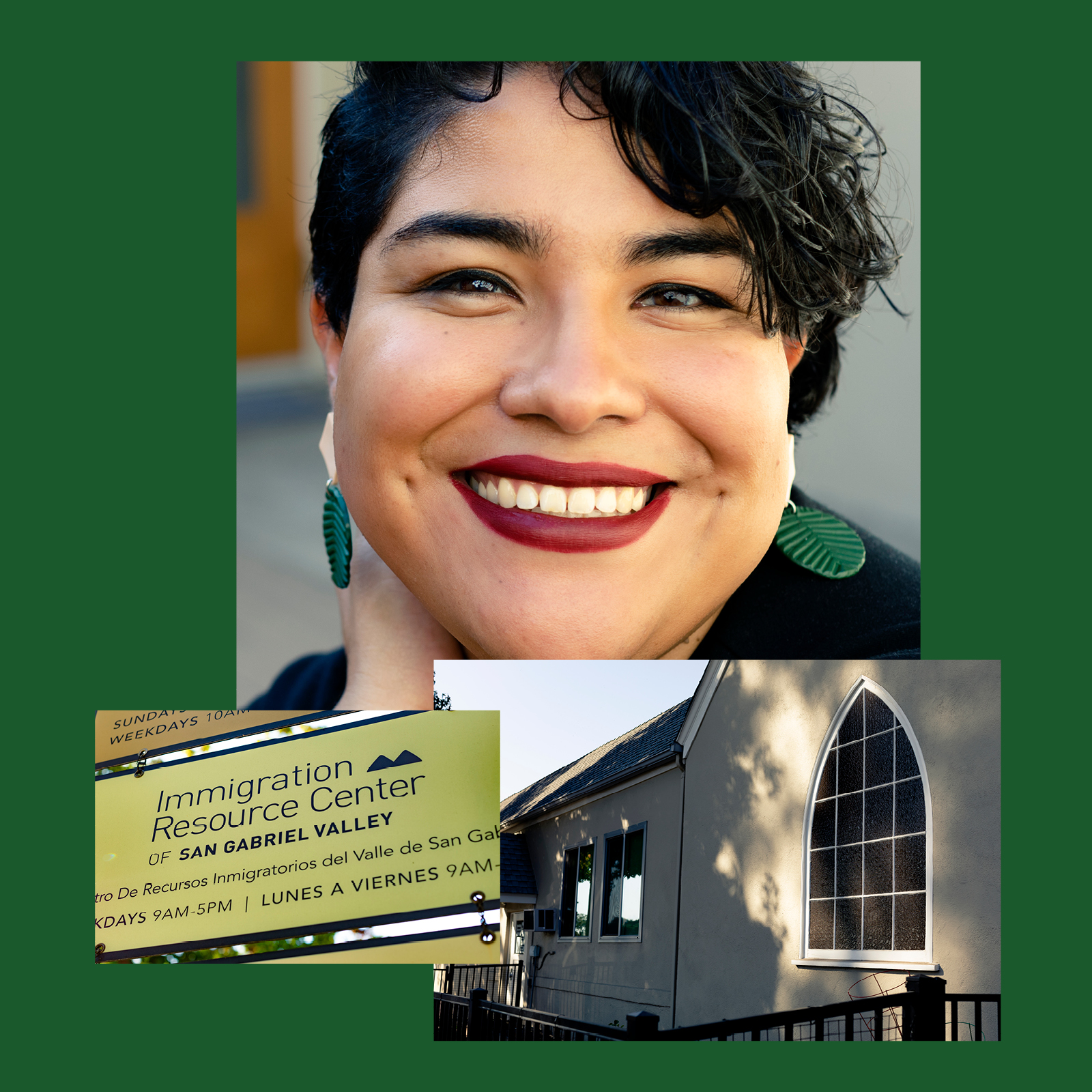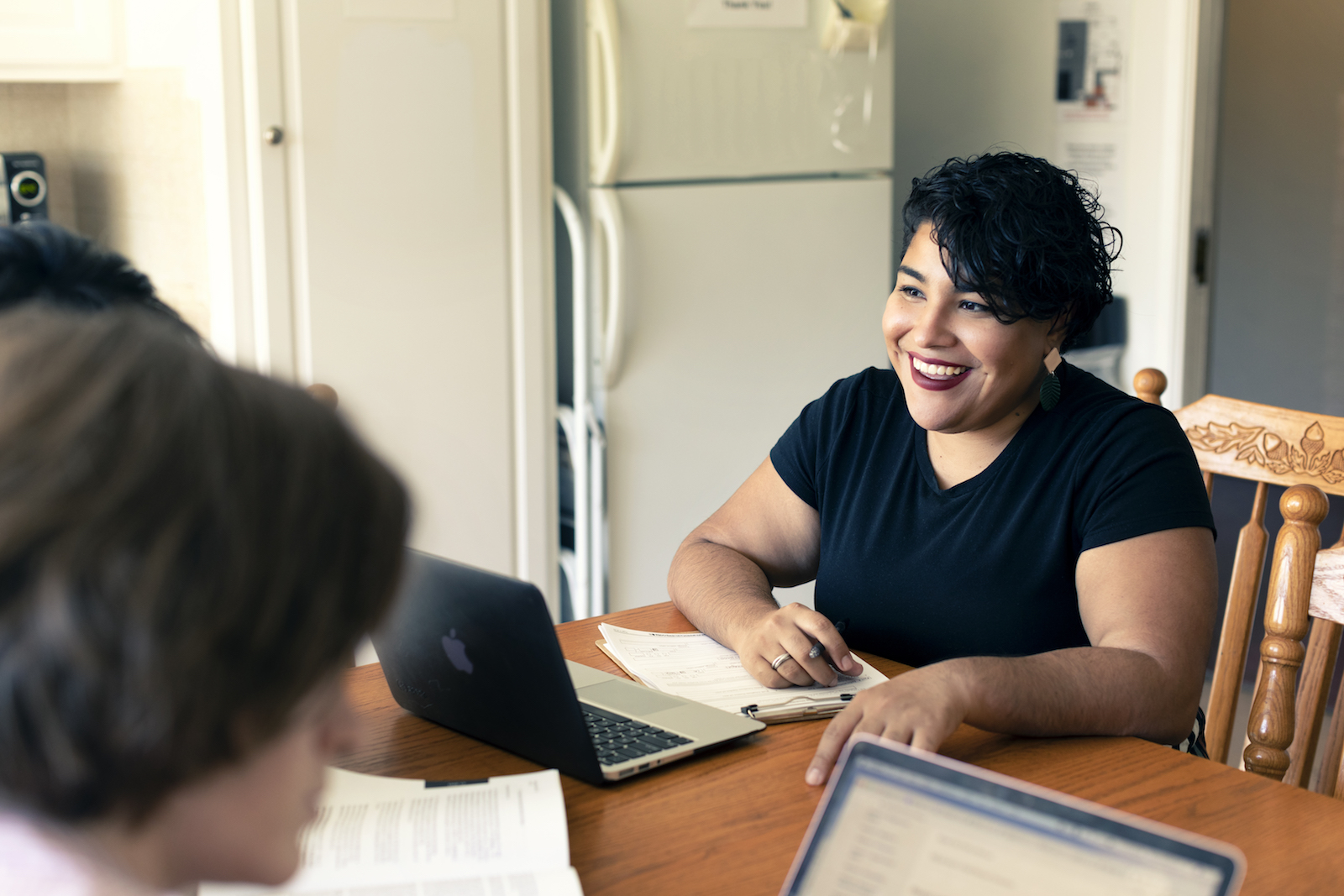
The latina church I grew up in very much identified itself with the people of Israel—people who literally crossed the desert,” says Rosa Cándida Ramírez (MDiv ’16). Rosa was the first in her family born in the United States, after her parents fled north from El Salvador in the 1980s because of the Salvadoran Civil War. Raised in an immigrant church made up of people with varying citizenship and immigrant statuses, Rosa describes her upbringing by saying, “Migration has always been part of our history and our reality.”
36898
Today, Rosa works at the Immigration Resource Center (IRC) of San Gabriel Valley, which provides affordable legal services and other resources to immigrants in the local community. The organization is small—with only three full-time staff members accompanied by part-time staff and volunteers—but the IRC has a wide reach and makes a big impact. The team works with people going through the naturalization process, handles family petitions, and walks alongside immigrant victims of violent crimes. They also provide educational services and connect people with other helpful local organizations. As the intake coordinator, Rosa is often the first face new clients see, and she helps guide them toward the particular assistance they need.

Jerome Blanco (MDiv ’16) is a writer and social media strategist for FULLER studio

Lindsey Sheets is video editor, colorist, and photographer for FULLER studio.
The latina church I grew up in very much identified itself with the people of Israel—people who literally crossed the desert,” says Rosa Cándida Ramírez (MDiv ’16). Rosa was the first in her family born in the United States, after her parents fled north from El Salvador in the 1980s because of the Salvadoran Civil War. Raised in an immigrant church made up of people with varying citizenship and immigrant statuses, Rosa describes her upbringing by saying, “Migration has always been part of our history and our reality.”
Today, Rosa works at the Immigration Resource Center (IRC) of San Gabriel Valley, which provides affordable legal services and other resources to immigrants in the local community. The organization is small—with only three full-time staff members accompanied by part-time staff and volunteers—but the IRC has a wide reach and makes a big impact. The team works with people going through the naturalization process, handles family petitions, and walks alongside immigrant victims of violent crimes. They also provide educational services and connect people with other helpful local organizations. As the intake coordinator, Rosa is often the first face new clients see, and she helps guide them toward the particular assistance they need.
Jerome Blanco (MDiv ’16) is a writer and social media strategist for FULLER studio
Lindsey Sheets is video editor, colorist, and photographer for FULLER studio.


“No day looks the same,” she says. Clients’ situations vary greatly, as everyone who comes through the IRC’s doors bears their own particular story and circumstances. This means each person’s journey through the legal system might take different turns, with unique ups and downs along the way. When it comes to pathways to a legal status, Rosa explains that a broad range of issues and personal history come into the mix of building one’s case. The citizenship process can take months or even years, and is incredibly subjective, with so much depending on the government officials whose desks a case lands on. Rosa says, “You don’t know if they’ve had a good day or a bad day, or if they’ve just had a sandwich and it just isn’t sitting well in their stomach. You never know.” She adds that nobody is helped by the fact that immigration legislation changes on a regular basis, often feeling like ever-shifting ground beneath their feet. As an example, Rosa points to the back and forth that the DACA (Deferred Action for Childhood Arrivals) policy endured over the last few years, being contested from court to court, until the Supreme Court upheld the policy.
“There are so many roadblocks,” Rosa says. But the IRC presses on, navigating the tumultuous system and helping as many as they can. The IRC served around 400 families in 2019 and even more in 2020. Still, Rosa laments the times when there is little they can do to help. She remembers how she had to explain to a teenage petitioner that they had no available pathway to legal status. “As a fifteen-year-old, how are you supposed to process that? How do you process that your life is suddenly so drastically changed?”
Rosa stresses the weight that these policies, systems, and processes have on people, and how a person’s legal status profoundly affects the way they are perceived and treated in society. She’s seen in her own personal communities and through the job that unkindness and disrespect characterize the standard treatment undocumented immigrants receive on both individual and systemic levels. “The most frustrating part for me is that people get dehumanized because of a little piece of paper.”
For Rosa, all of it is deeply personal. She recounts her own family’s history of going through the system. In the ’80s, her father was the very first client of an organization very similar to the IRC, and her parents eventually gained their legal status through President Ronald Reagan’s amnesty in 1986. When Rosa thinks about those migrating into the US today, she says, “I think of my parents and my family members, and of how I would have wanted someone else to treat them if they arrived somewhere asking for help. It’s about creating space, and being hospitable, and making sure that people are treated kindly.”


As for her own identity not as an immigrant but as a child of immigrants, Rosa carries a set of complex emotions. She names a duality she wrestled with for years: her Salvadoran self and her US American self. “Being born in the States, I struggled with guilt. Being US born, I didn’t have to choose to come here and say I’m going to make a better life. That was given to me.” Yet on the other hand, she has always felt that, “I was born to a land that I am aware is not mine.”
She struggled with this sense of belonging through her childhood and even through her time in college, feeling more US American on some days and feeling more Salvadoran on others, as if she needed to make a choice between one or the other but couldn’t.
In recent years, however, which included her season at Fuller, she’s learned to understand and navigate some of these dynamics. Her experience in the Centro Latino made a big impact on her. The Centro Latino and Brehm Center were key reasons Rosa chose to attend Fuller, as they both touched on significant parts of her identity and calling. Rosa, who serves as a worship pastor at her church, took her theology classes in English but took her ministry classes in Spanish, earning her MDiv bilingually. As she grappled with theology, deepened her learning, and grew in her ministry calling in both spheres simultaneously, she found the lines inside her blur, helping her embrace both cultures as core to who she was. She laughs at the fact that both centers happened to be housed in the same building of Fuller’s Pasadena campus. “It was a representation of who I was!” Rosa says. “My time at Fuller helped me expand my imagination. I used to think, ‘I’m either Salvadoran or US American,’ and my time at Fuller was spent wrestling with that. But now I know that neither is a static label. I’m both, and that’s okay.”
Her own grappling with identity influences her work at the IRC, because Rosa recognizes there is a delicate tension and dangerous line between walking alongside others to help them and having a savior complex. Christians can be very susceptible to the latter, she acknowledges. In recognizing her own familial history together with her birthright of citizenship, Rosa can name the power she has while leaning into empathy. She says, “It’s been a saving, transformative journey to be here at the IRC,” she says, “where I’ve been able to face what it means for me to have my privilege but then use it to help other people and know it isn’t about me. It’s not about my own guilt or fragility as a citizen. It’s about being able to help people.”
And helping people is what Rosa does. She’s bent on making sure that everything she does speaks to the dignity each client has and deserves, despite a system and society that tell them otherwise. “Every meeting we have with clients, every time we show empathy or compassion, every time we fill out a form—it’s an act of resistance, a reminder that at the end of the day, people are not defined by a piece of paper.”

Kirsteen Kim, Paul E. Pierson Chair in World Christianity and associate dean for the Center for Missiological Research, introduces this issue’s theme: migration